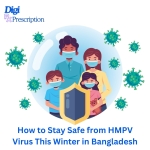
How to Stay Safe from HMPV Virus This Winter in Bangladesh
As winter approaches, respiratory viruses, including Human Metapneumovirus (HMPV), become more prevalent, posing health risks to all age groups, especially children, the elderly, and individuals with chronic health conditions. In Bangladesh, where winter months often see a surge in respiratory infections, it’s crucial to take proactive measures to stay safe from HMPV. This guide provides practical tips and reliable sources of information to help you and your family stay protected this season.
What is HMPV?
Human Metapneumovirus (HMPV) is a common respiratory virus that can cause mild cold-like symptoms or severe complications such as bronchitis or pneumonia. It spreads primarily through respiratory droplets from coughing or sneezing, direct contact with infected individuals, and contaminated surfaces.
In Bangladesh, HMPV cases often rise during winter when viral infections are more widespread due to cooler temperatures and increased indoor gatherings.
Symptoms of HMPV
Common symptoms of HMPV include:
- Cough
- Runny or congested nose
- Fever and chills
- Sore throat
- Fatigue
- Wheezing or shortness of breath
Severe cases may lead to respiratory distress, requiring medical intervention.
How to Stay Safe from HMPV This Winter
1. Practice Proper Hygiene
- Wash Hands Regularly: Use soap and water to wash your hands for at least 20 seconds. If soap is unavailable, use an alcohol-based hand sanitizer.
- Avoid Touching Your Face: Prevent the virus from entering your system by not touching your eyes, nose, or mouth.
- Clean and Disinfect Surfaces: Frequently clean high-touch areas such as door handles, smartphones, and countertops.
2. Wear a Mask
Wearing a mask, especially in crowded places like markets, public transport, and clinics, can reduce exposure to respiratory droplets carrying the virus.
3. Maintain Social Distancing
Avoid close contact with people showing signs of respiratory illness, such as coughing or sneezing. If you are unwell, stay home to prevent spreading the virus.
4. Boost Your Immune System
- Eat a Balanced Diet: Include immune-boosting foods such as citrus fruits, green leafy vegetables, and foods rich in zinc and vitamin C.
- Stay Hydrated: Drink plenty of fluids to keep your respiratory tract moist and healthy.
- Get Adequate Sleep: Proper rest is essential for a strong immune response.
5. Avoid Smoking and Air Pollution
Smoking and exposure to air pollution can weaken your lungs, making you more vulnerable to respiratory infections. Minimize exposure to smoke, dust, and other pollutants during winter.
6. Stay Updated on Vaccines and Medical Advice
While there is no specific vaccine for HMPV yet, staying updated on other respiratory illness vaccines (e.g., influenza, COVID-19, and RSV) can provide some level of protection. Consult your doctor for advice on preventive measures tailored to your health.
7. Use Telemedicine Services
If you suspect HMPV symptoms, consider using telemedicine services for a preliminary consultation. This minimizes exposure to crowded healthcare facilities while ensuring timely medical advice.
What to Do If You Develop Symptoms
If you or a family member experiences symptoms of HMPV:
- Isolate from others to prevent transmission.
- Monitor symptoms closely, especially in high-risk individuals like children and the elderly.
- Seek medical attention if symptoms worsen or include difficulty breathing, high fever, or persistent coughing.
Conclusion
Staying safe from HMPV this winter in Bangladesh requires a combination of proactive hygiene practices, immune-boosting habits, and staying informed through reliable resources. By following these tips and leveraging healthcare services, you can protect yourself and your loved ones from this common respiratory virus.
Reliable Sources of Information on HMPV
Local Resources
- Directorate General of Health Services (DGHS), Bangladesh: Provides updates on respiratory illnesses and public health advisories. Visit DGHS
- Local Hospitals and Clinics: Many healthcare providers in Bangladesh now offer telemedicine services for timely consultations.
Global Resources
- World Health Organization (WHO): Comprehensive information on respiratory illnesses, including prevention and treatment. Visit WHO
- Centers for Disease Control and Prevention (CDC): Regular updates on HMPV and other respiratory viruses. Visit CDC
